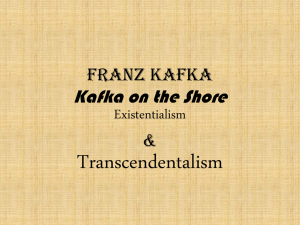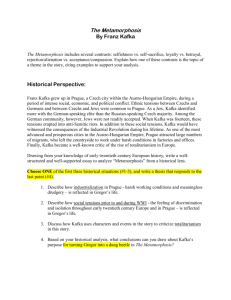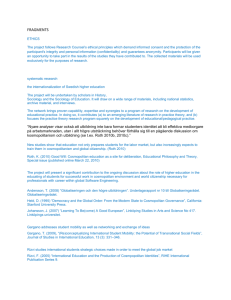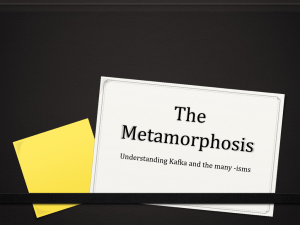Monstrous Transformations: Readings in Franz Kafka and Philip Roth
advertisement
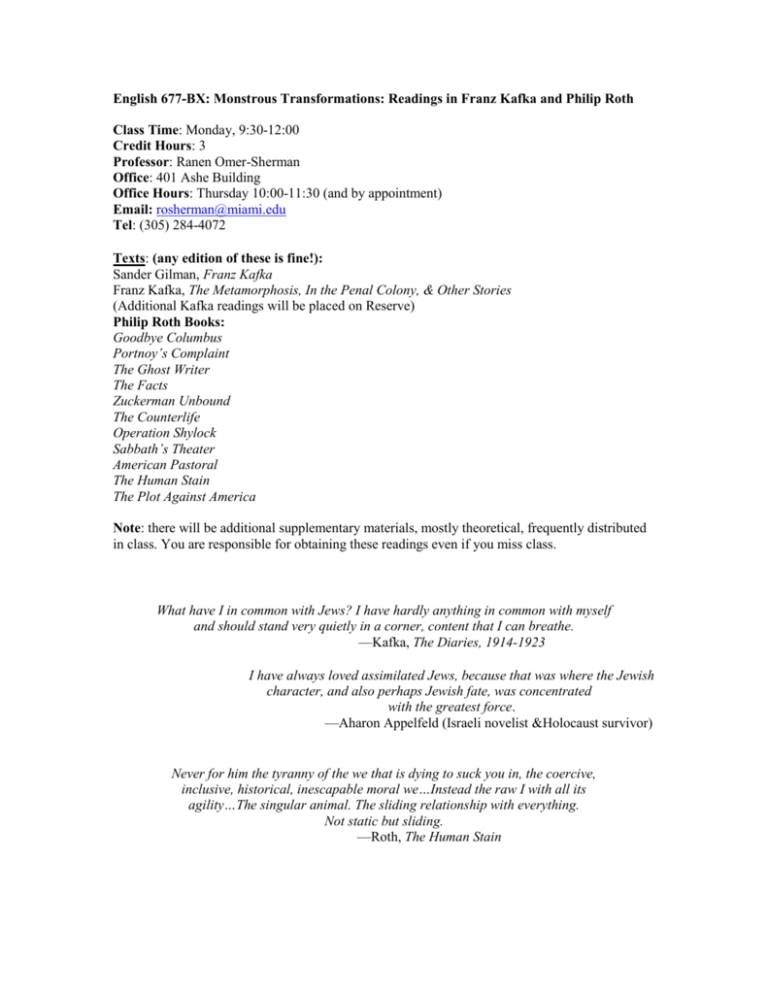
English 677-BX: Monstrous Transformations: Readings in Franz Kafka and Philip Roth Class Time: Monday, 9:30-12:00 Credit Hours: 3 Professor: Ranen Omer-Sherman Office: 401 Ashe Building Office Hours: Thursday 10:00-11:30 (and by appointment) Email: rosherman@miami.edu Tel: (305) 284-4072 Texts: (any edition of these is fine!): Sander Gilman, Franz Kafka Franz Kafka, The Metamorphosis, In the Penal Colony, & Other Stories (Additional Kafka readings will be placed on Reserve) Philip Roth Books: Goodbye Columbus Portnoy’s Complaint The Ghost Writer The Facts Zuckerman Unbound The Counterlife Operation Shylock Sabbath’s Theater American Pastoral The Human Stain The Plot Against America Note: there will be additional supplementary materials, mostly theoretical, frequently distributed in class. You are responsible for obtaining these readings even if you miss class. What have I in common with Jews? I have hardly anything in common with myself and should stand very quietly in a corner, content that I can breathe. —Kafka, The Diaries, 1914-1923 I have always loved assimilated Jews, because that was where the Jewish character, and also perhaps Jewish fate, was concentrated with the greatest force. —Aharon Appelfeld (Israeli novelist &Holocaust survivor) Never for him the tyranny of the we that is dying to suck you in, the coercive, inclusive, historical, inescapable moral we…Instead the raw I with all its agility…The singular animal. The sliding relationship with everything. Not static but sliding. —Roth, The Human Stain We will consider the complex representation of ethnicity, assimilation and the transformation of the individual and we will be especially concerned with the question of just why the latter is invariably portrayed as a grotesque, or ominous, process by our two authors. Kafka (1883-1924) and Roth (b. 1933) are two of the most disturbing and inventive figures in the modern Jewish canon and for both writers it is evident that panic nourished their creative visions. As early as 1968, critics such as Robert Alter sought to illuminate Kafka’s fraught mediation of the “universal” and the particular as a struggle over his own identity: “Kafka could envision the ultimate ambiguities of human life in general with a hyperlucidity because he had experienced them in poignant particularity as a Jew. Out of the stuff of Jewish experience which he himself thought of as marginal, he was able to create fiction at once universal and hauntingly Jewish.” And yet of course some of Kafka’s most memorable literary protagonists aren’t even “human”: a burrowing mole, a mouse singer, and of course poor Gregor Samsa, who wakes up one morning to find he has been transformed into an insect. We will investigate the curious relation between Kafka’s amorphous creatures and the nature of contemporary Jewish life in Europe as he knew it. From the outset, you should understand that it is primarily Jewish readers and critics who perceive Kafka as a Jewish writer. This isn’t a matter of possessiveness (the way one claims a sports hero for an ethnic group), but rather a matter of Kafka’s work itself. Jewish readers cannot avoid hearing the distinct echoes of the Dreyfus Affair in “In the Penal Colony,” or those of the blood libel in The Trial or in his famous cockroach a horrifying caricature of the way others have so often seen them (and at times, the way they sometimes see themselves). Yet this awareness is far more than mere suspicion. Though none of his published works mention it explicitly, Kafka’s private letters and diaries reveal an obsessive interest in Jewish identity and even Zionism. In the end, Kafka’s broader fame comes from the point where this obsession merges with more ordinary fears, making non-Jewish readers see his work as expressing an abstract “existential” dread, rather than the very real dread that defined European Jewish existence. After examining Kafka’s complex relation to his status as a Jewish writer in Central Europe, we will devote most of the semester to exploring the most important developments in Roth’s oeuvre alongside provocative theorists of ethnic identity as well as important voices among the remarkable body of scholarship on Roth and his works which spans nearly half a century. Roth has long claimed to be profoundly influenced by his early reading of Kafka, and, like his European inspiration, he creates worlds in which transformation often appears as a failure of will and identity. His earliest stories (Goodbye Columbus [1959] and first novel (Portnoy’s Complaint [1969]), which created tremendous controversy in Jewish American life, are variations on Kafka’s anxious tales of failed transformations and grotesque metamorphosis in which the yearning of “strangers” to become “citizens” often seems to carry a heavy cost. As we will see, this anxiety has been a strikingly consistent preoccupation for Roth, surfacing with a sense of even greater urgency in critically acclaimed novels such as American Pastoral (1997), a troubled paean to fading values in American life during the Vietnam War, or The Human Stain (2000), a radical re-envisioning of the early 20th-century novel of racial “passing” that interrogates the erasure/repression of ethnic/racial origins, the gains and losses incurred by suppressing/embracing difference. Unjustly, Roth’s protagonists are apparently destroyed, not so much in spite of, but precisely because of the trust they place in the safeguards of a conventional and respectable life, in a seemingly civilized society. As his recurring character Zuckerman remarks, “The tragedy of the man not set up for tragedy…that is every man’s tragedy.” A Few Words about Our Reading Schedule Even the most casual glance through Richter’s holdings (or searching online at Amazon.com) reveals that taking on Roth’s work is quite a formidable task. He has published 26 books of fiction and nonfiction, and the criticism surrounding his novels is of a truly astonishing scale. Everyone seems to find what they want in Roth’s staggering oeuvre. There will be a great deal of reading for this course, and it’s important that you pace yourself throughout the semester. Some novels, such as Portnoy’s Complaint and The Ghost Writer, are modest in length, while others (most of those are his later novels) weigh in at around 400 pages. We’ll also be reading a number of interviews and essays by Roth as well as selections from critical works devoted to his work. For most books that we read for class, there will be one or two of these secondary sources. So my best advice: plan accordingly. Look toward what lies ahead and structure your time well. Research Paper A journal-length essay (18-25 pages), to be submitted in outlined stages (a process described in a separate document). Any topic for your paper/presentation is fair game, as long as it relates to Kafka’s and/or Roth’s writings. You may focus on one or more of the novels/stories that we’re reading this semester, or you may also choose to write on a novel that we’re not reading. You can limit yourself to just one work or you can compare/contrast more than one, or even do a comparative study with another (and appropriate) writer/text. A prospectus must be submitted by the middle of the semester. In addition to my feedback, you may also choose to work closely with a peer to facilitate the revision of your paper (a detailed clarification of this option will be distributed in class). You will present your research paper to the class Oral Work: I view my role in this course as a facilitator. Hence, early in the semester, a sign up sheet will be distributed for discussion topics. Each of you will be responsible for preparing two discussions during the semester for which you will also provide a set of 4-5 discussion questions, e-mailed to the group by 5:00 PM every other Wednesday (at the latest!). When appropriate, handouts should be brought in to help outline your concerns and provoke response. All members of the seminar must contribute passionately to every discussion even when they are not designated discussion leaders for that session. You must keep up with the reading schedule. The ultimate success of the seminar depends on your thoughtfulness and willingness to engage the texts as well as each other. Attendance is a critical requirement. E-Mail: It is your responsibility to “register” your email address with the university so that you will receive any email comments that I will send out to the class (my own email address is included on this syllabus). Course Calendar Jan 22 Sander Gilman, Franz Kafka; Franz Kafka, The Metamorphosis, In the Penal Colony, & Other Stories; Kafka’s dream of June 25, 1914 (handout from Diaries); Chronology (handout) “Paradise,” “Animal in the Synagogue,” “Josephine the Mouse Singer” and other parables and short works (handout) Jan 29 Kafka & the Critics: Robert Alter’s “On Not Knowing Hebrew,” RICHTER RESERVES (from Necessary Angels: Tradition and Modernity in Kafka, Benjamin, and Scholem); Jacques Derrida’s “Before the Law” RICHTER RESERVES (from Acts of Literature); Ruth Gross’ “Hunting Kafka”; Sander Gilman, “A Dream of Jewishness Denied: Kafka’s Tumor and ‘Ein Landarzt’ RICHTER RESERVES Feb 5 Goodbye Columbus; Hana Wirth-Nesher, “Resisting Allegory; or, Reading ‘Eli, the Fanatic’ in Tel Aviv,” RICHTER RESERVES; Chronology (handout); Roth’s essay “ ‘I Always Wanted You to Admire My Fasting’; or, Looking at Kafka” (handout) Feb 12 Portnoy’s Complaint; Alan Cooper, “The Alex Perplex” (from Philip Roth & the Jews) RICHTER RESERVES; Ranen Omer-Sherman, Excerpt from: “ ‘No Coherence’”: Philip Roth’s Lamentations for Diaspora” BLACKBOARD DOCUMENTS Feb 19 The Ghost Writer; The Facts; Interview with Ivan Klima; Interview with Milan Kundera; Interview with Aharon Appelfeld (handouts); Patrick O’Donnell’s “The Disappearing Text: Philip Roth’s The Ghost Writer” RICHTER RESERVES Feb 26 Zuckerman Unbound; suggested reading: Jonathan Brent, “The Unspeakable Self: Philip Roth & the Imagination” in Asher Milbauer’s Reading Philip Roth RICHTER RESERVES (hard copy only) Mar 5 The Counterlife; Operation Shylock; Debra Shostak’s “ ‘This Obsessive Reinvention of the Real’: Speculative Narrative in Roth’s The Counterlife” (journal essay); “The Diaspora Jew and the ‘Instinct for Impersonation’: Philip Roth’s Operation Shylock,” (journal essay); and “Inventing the Real” (from Shostak’s Philip Roth: Countertexts, Counterlives) all three essays on RICHTER RESERVES Prospectus due in class March 10-18 Fall Recess Mar 19 Sabbath’s Theater; Ranen Omer-Sherman, “ ‘A Little Stranger in the House’: Madness and Identity in Sabbath’s Theater”; Ross Posnock, “Letting Go, or How to Lead a Stupid Life: Sabbath’s Nakedness” (handouts) Mar 26 No class scheduled: catch up on reading and research! Apr 2 American Pastoral; Derek Royal, “Pastoral Dreams and National Identity in American Pastoral & I Married a Communist” (handout) Roy Goldblatt, “The Whitening of the Jews and the Changing Face of Newark” RICHTER RESERVES Apr 9 The Human Stain; Ross Posnock, “Purity and Danger: On Philip Roth” RICHTER RESERVES; Matthew Wilson, “Reading The Human Stain through Charles W. Chesnutt: the Genre of the Passing Novel”; Dean J. Franco, “Being Black, Being Jewish, and Knowing the Difference: Philip Roth’s The Human Stain; Or, It Depends on what the Meaning of ‘Clinton’ Is” (handouts); view excerpt from The Human Stain film adaptation; Preliminary draft due in class Apr 16 The Plot Against America; Philip Roth’s short story “On the Air” RICHTER RESERVES; Greil Marcus, “Philip Roth & the Lost Republic,” from The Shape of Things to Come: Prophecy and the American Voice (handout) Apr 23 Oral Presentation to your peers; final version due to me & View A Practical Lover of Freedom: Ross Miller’s Interview with Philip Roth (Ben Gurion University Words & Images series)
